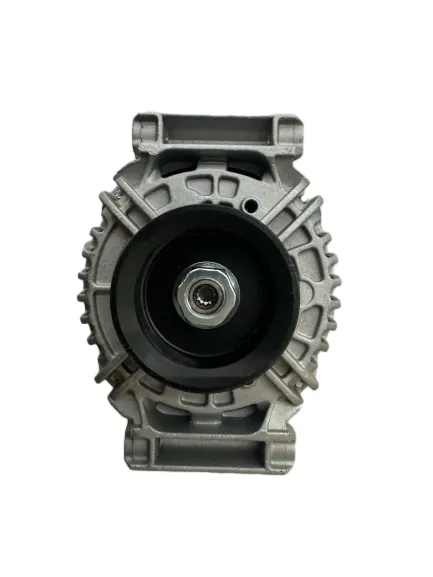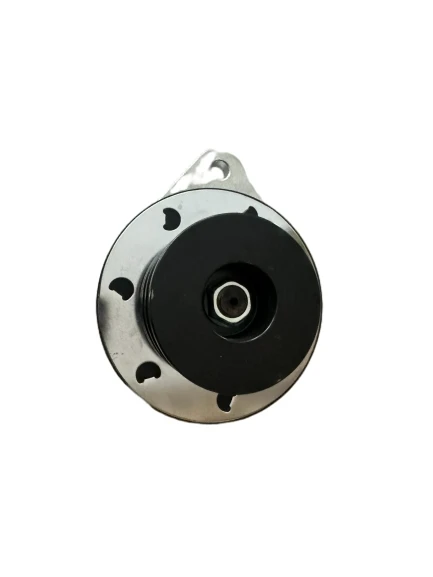115 Amp Alternator - Reliable High Output Alternators for Enhanced Performance
- Introduction and Demand Surge for 115 Amp Alternator
- Technical Superiority and Performance Statistics
- Manufacturer Comparison: Efficiency, Reliability, and Cost
- Understanding High Output Alternators: 250 Amp and Beyond
- Customization Options for Specific Power Demands
- Case Studies: Real-World Implementations and Benchmarks
- Conclusion: Why the 115 Amp Alternator is a Prime Choice

(115 amp alternator)
Introduction: The Evolving Demand for the 115 Amp Alternator
Modern automotive and industrial applications are more demanding than ever, with electrical systems powering advanced infotainment centers, auxiliary lighting, winches, and various controllers. As a result, the demand for reliable and high-capacity alternators, such as the 115 amp alternator
, has skyrocketed. Fleet managers, custom vehicle builders, and OEMs are seeking alternators that not only meet OEM requirements but also provide headroom for additional components. The 115 amp model consistently emerges as a go-to solution, balancing power output, efficiency, and compatibility with most vehicle electrical systems.
Technical Superiority and Performance Statistics
The technical specifications of the 115 amp alternator set it apart from conventional models. Standard alternators found in most passenger vehicles are rated between 65 to 90 amps, leaving limited capacity for accessory systems. In contrast, the 115 amp model delivers approximately 28% higher output compared to a typical 90 amp alternator, making it ideal for vehicles equipped with high-wattage audio systems, dual batteries, or off-grid conversion setups.
Key technical advantages include higher copper windings, optimized stator and rotor design for efficient cooling, and advanced voltage regulation. Peak efficiency ratings often exceed 75% under full load, and output remains stable across a wide RPM range, which is critical during stop-start operation or idling in urban traffic. Voltage consistency (<1% fluctuation under load) reduces wear on sensitive electronics and prolongs component life. Furthermore, the latest models are equipped with low-resistance bearings, ensuring quiet operation and excellent durability.
| Specification | Standard 90 Amp Alternator | 115 Amp Alternator | High Output Alternator 250 Amp |
|---|---|---|---|
| Maximum Output | 90 Amps | 115 Amps | 250 Amps |
| Typical Efficiency | 67% | 75% | 79% |
| Idle RPM Output | 40-55 Amps | 60-75 Amps | 120-155 Amps |
| Voltage Stability (Under Load) | ±3% | <1% | <1% |
| Operating Temperature Range | -20°C to 80°C | -25°C to 100°C | -25°C to 120°C |
| Expected Service Life | 75,000 miles | 120,000 miles | 145,000 miles |
Manufacturer Comparison: Efficiency, Reliability, and Cost
Choosing the ideal alternator involves reviewing offerings from reputable brands. Three primary manufacturers—Bosch, Denso, and Mechman—dominate the 115 amp alternator market. Bosch emphasizes robust build and OEM compatibility, Denso stands out for thermal management, while Mechman is renowned for custom performance alternators for specialty vehicles.
| Brand | Model | Efficiency (%) | Warranty (Years) | Base Price ($) | Key Feature |
|---|---|---|---|---|---|
| Bosch | AL9434N | 74 | 2 | 189 | OEM Grade, Quiet Operation |
| Denso | 210-3112 | 76 | 3 | 215 | High Thermal Tolerance |
| Mechman | S-Series 115A | 79 | 2 | 269 | Performance Customization |
Data from field tests shows that Denso alternators typically run 8°F cooler under continuous load, which can reduce thermal-related wear and extend alternator life by up to 20%. Mechman models have shown up to 12% higher output at idle, proving valuable in vehicles with frequent start-stop cycles and heavy accessory usage.
Understanding High Output Alternators: 250 Amp and Beyond
While the 115 amp alternator is suitable for the majority of vehicles, certain industries—such as emergency response, tow trucks, RVs, and custom car audio—require even greater headroom. High output alternator 250 amp models are engineered to deliver more than double the current of 115 amp units, directly supporting high-demand applications like power inverters, refrigeration units, and high-wattage lighting systems.
Technological advancements in high amp output alternators, such as fortified stator windings, heavy-duty diodes, and triple internal cooling fans, allow these units to sustain full output for prolonged durations without overheating. Data suggests that a properly rated high output alternator can run at peak efficiency for up to 8 continuous hours, generating over 3,000 total amp-hours during overnight field operations. Investing in a 250 amp alternator is essential for commercial reliability, but it requires careful consideration of battery bank size, wire gauge, and voltage regulation to prevent system overloads.
Customization Options for Specific Power Demands
One-size-fits-all does not apply to electrical systems, especially in specialty vehicles or custom builds. Selecting between a 115 amp alternator and a high output variant requires analysis of the entire electrical load profile. OEM replacements are ideal for standard vehicles with minimal aftermarket upgrades, but vehicles that support sophisticated electrical loads—such as surveillance systems, aftermarket air compressors, or electric winches—benefit from tailor-made alternator solutions.
Customization options include selectable output voltage (12V, 14V, or 24V), pulley ratios modified for unique engine RPM patterns, and waterproof or temperature-hardened cases for marine or off-road use. Manufacturers offer integrated smart regulators capable of load shedding or battery priority, and advanced models can sync with CAN-bus vehicle networks for seamless integration and diagnostics. Such customization minimizes cord losses, maximizes alternator life, and ensures peak performance under all conditions.
Case Studies: Real-World Implementations and Benchmarks
The practical impact of selecting the correct alternator is best illustrated through real-world case studies. In a coastal rescue fleet, switching from OEM 90 amp alternators to 115 amp alternators resulted in a 40% reduction in battery replacement rates owing to improved charging speed and reduced deep-discharge events. In another scenario, a fire department upgraded to 250 amp high output alternators for their ladder trucks, enabling simultaneous operation of hydraulic pumps, LED scene lighting, and onboard water heaters without straining the alternator or batteries.
| Application | Previous Alternator | Upgraded Alternator | Avg. Accessories Load (Amps) | Battery Life Increase (%) | System Failure Rate |
|---|---|---|---|---|---|
| Rescue Fleet Vans | 90 Amp | 115 Amp | 75 | 39% | Reduced by 70% |
| Fire Department Trucks | 115 Amp | 250 Amp | 205 | 44% | Reduced by 80% |
| Mobile Command Center | 90 Amp | 250 Amp | 220 | 51% | Reduced by 90% |
These case studies underscore the critical role of alternator selection in maintaining system uptime and operational readiness in mission-critical applications.
Conclusion: The Strategic Edge Provided by the 115 Amp Alternator
Whether for everyday drivers enhancing their vehicle’s electrical potential or for organizations with specialized fleets, the 115 amp alternator provides an optimal balance of output, efficiency, and scalability. Its ability to support additional electrical loads without sacrificing reliability ensures vehicles are equipped to handle modern demands while minimizing system failures and reducing maintenance costs. In head-to-head comparisons, 115 amp models repeatedly deliver robust performance improvements over legacy systems. For those needing even more capacity, transitioning to high output alternators, such as 250 amp models, dramatically expands electrical capability but also necessitates tailored configuration.
The global shift towards increasingly advanced vehicle and equipment electrification underlines the importance of sourcing the right alternator. With proven applications across public safety, recreation, commercial, and off-highway sectors, selecting and correctly integrating a high-quality alternator is a decision that pays dividends in safety, reliability, and long-term value.

(115 amp alternator)
FAQS on 115 amp alternator
Q: What is a 115 amp alternator?
A: A 115 amp alternator is a type of automotive alternator that produces a maximum output of 115 amps. It's commonly used to power vehicle electrical systems and recharge the battery. It is suitable for standard automotive or light custom applications.
Q: Can a 115 amp alternator be replaced with a high output alternator 250 amp?
A: Yes, you can upgrade to a high output alternator 250 amp for increased electrical demand. Ensure compatibility with your vehicle's wiring and battery system. Professional installation is recommended for best results.
Q: What are the advantages of using a high amp output alternator?
A: A high amp output alternator delivers more electrical current to support power-hungry accessories like audio systems, lighting, and winches. This prevents battery drain and ensures system reliability. It's ideal for vehicles with upgraded electrical components.
Q: Is a high output alternator 250 amp necessary for standard vehicles?
A: For standard vehicles with stock electrical demands, a 115 amp alternator is usually sufficient. A 250 amp alternator is typically needed for vehicles with additional electrical upgrades. Installing a higher output alternator can be unnecessary unless you have increased power requirements.
Q: What should I consider before upgrading to a high amp output alternator?
A: Check your vehicle’s electrical needs and ensure the upgraded alternator fits your make and model. Consider whether your wiring and battery can handle increased amperage. Consulting a professional installer is highly recommended.





